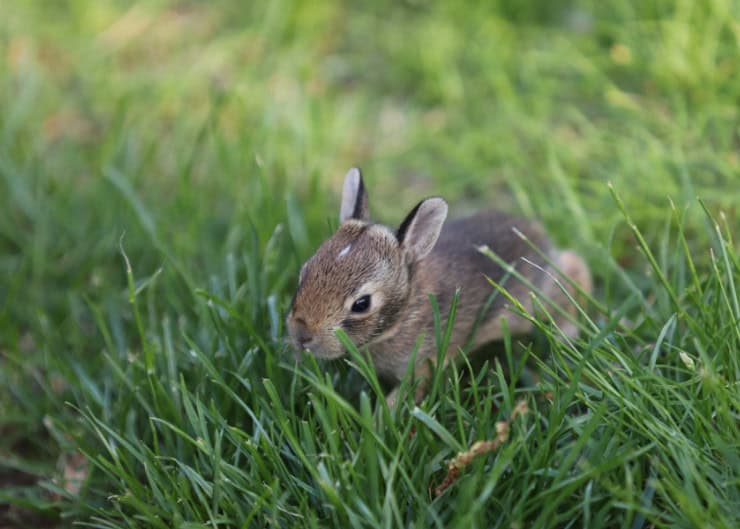It is not uncommon for homeowners to come across what appears to be an abandoned animal while tending to their property. Whether it is baby rabbits hidden in the grass, a litter of kittens sheltered under a shed, or a roaming dog in the neighborhood, it is natural to want to help. However, before taking any action, it is important to understand when intervention is necessary and when it is best to leave the situation alone.
Finding Baby Rabbits
If you discover a shallow nest of baby rabbits—often just a small depression in the ground lined with fur and grass—it may look unattended, but this is usually not the case. Mother rabbits typically feed their young only twice a day, at dawn and dusk, to avoid attracting predators.
What to Do:
- Do not touch the babies unless absolutely necessary. If the nest is intact and the babies appear healthy, it is best to leave them alone.
- If the nest has been disturbed, gently return the babies and cover the nest back up. You can place a small grid of string or sticks over the nest to monitor whether the mother returns.
- If you are certain the mother has not returned within 12 hours or the babies appear injured or weak, contact a local wildlife rehabilitator for assistance.
Finding Kittens
Outdoor kittens often appear to be abandoned, but their mother is usually nearby searching for food or taking a short break. Removing kittens prematurely can reduce their chances of survival.
Steps to Take:
- Observe from a distance. If the kittens are warm, quiet, and appear clean, the mother is likely caring for them. Check back after several hours before taking any action.
- If the mother does not return within eight hours, or the kittens seem cold, dirty, or malnourished, it may be time to intervene.
- Contact a local animal rescue organization or shelter before handling the kittens. They can guide you on the next best steps.
- If you are considering keeping the kittens, remember that they should remain with their mother until they are at least eight weeks old. Before adopting them, ensure they receive proper veterinary care, including vaccinations and spaying or neutering.
Finding Baby Birds and Other Wildlife
It is common to find fledgling birds on the ground during the spring and summer months. These young birds are often learning to fly and are still under the care of their parents.
What to Do:
- Leave fledglings alone unless they are in immediate danger. Their parents are usually nearby and will continue to feed and protect them.
- If the bird appears injured or abandoned, contact a licensed wildlife rehabilitator before attempting to help.
Seeing a Roaming Dog
Encountering a roaming dog can be concerning, whether the animal has a collar or not. The dog may be lost, stray, or simply exploring, but it is important to approach the situation carefully for both your safety and the dog’s well-being.
Steps to Take:
- Assess the Situation: If the dog appears aggressive or frightened, do not attempt to approach it. Instead, contact local animal control immediately.
- If the Dog Is Friendly and Approachable: Check for a collar and identification tags. If the dog has tags, try contacting the owner directly.
- If There Are No Tags: Contact local animal control or a nearby shelter. Many dogs are microchipped, and professionals can scan them to locate the owner.
- Do Not Assume You Can Keep the Dog: Stray holding periods vary by location, and legally, shelters must attempt to locate the rightful owner before placing the dog for adoption or allowing someone else to take ownership.
Who to Call:
- Local Animal Control or the County Humane Society
- Nearby Animal Shelters and Rescue Organizations
- Non-Emergency Police Line (if animal control is unavailable and the dog poses a risk to traffic or public safety)
Quick Dos and Don’ts
Do:
- Observe before intervening.
- Use gloves if handling any wild animal becomes necessary.
- Keep pets and children away from the area.
- Contact professionals for advice before taking animals into your care.
Don’t:
- Assume an animal is abandoned simply because it is alone.
- Attempt to raise wild animals yourself. In many cases, this is illegal and requires specialized care.
- Try to keep a stray dog or cat without reporting it to the appropriate authorities.
At Mr. Lister Realty, we believe in fostering safe and welcoming environments for both people and wildlife. If you are preparing your property for sale or simply want to be a responsible homeowner, understanding how to handle encounters with abandoned or stray animals is an important part of good stewardship.
For more helpful home and property tips, visit the blog section at MrListerRealty.com.

